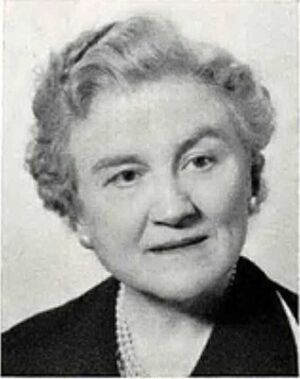Welcome to GAMEO
Encyclopedia Index
A
B
C
D
E
F
G
H
I
J
K
L
M
N
O
P
Q
R
S
T
U
V
W
X
Y
Z
0-9
(special chars)
Featured Article: "Leaman, Bertha Ruth (1893-1975)"
Bertha Ruth Leaman: historian and likely the first North American Mennonite woman of Swiss-South German heritage to earn a PhD degree, was born 2 February 1893 in Paradise Township, Lancaster County, Pennsylvania, USA, to Christian B. Leaman (1858-1928) and Anna Mary Denlinger Leaman (1863-1900). She was the fifth of six children (two of whom died in infancy) of Christian and Anna Mary Leaman. Following Anna Mary Leaman’s death, Christian Leaman married Mary Emma Herr (1870-1950), and together, they had a daughter. The Leaman household also included a foster daughter. Bertha Leaman died on 6 October 1975 in Kennett Square, Chester County, Pennsylvania, and was buried in the Strasburg Mennonite Church cemetery in the borough of Strasburg, Lancaster County, Pennsylvania. Bertha Leaman’s family of origin was active at Strasburg Mennonite Church, where Christian Leaman served as the sexton for many years. Bertha Leaman graduated from Paradise Township High School in 1910 and then taught in the township’s primary schools for seven years. She later told a friend that her goal had been to teach until she had saved enough money to attend college, despite opposition from her relatives to higher education for women. In September 1917, Bertha left for Indiana and enrolled at Goshen College. She graduated from Goshen College in 1921 and was hired to stay on as a faculty member to teach history. She also served as the college’s registrar. After Goshen College closed (temporarily) in 1923, Leaman enrolled at the University of Chicago and earned a MA in European history in 1924. She spent the summer of 1927 at the University of Grenoble in France and studied at the Sorbonne in Paris, France, during the 1927-1928 school year. In 1935 she received her PhD from the University of Chicago, writing her dissertation on the foreign policy of the French Socialist Party. Bertha Leaman held faculty positions at several colleges, including those operated by the Church of the Brethren. Her longest tenure was at a public institution, West Liberty State College, West Liberty, West Virginia, USA, from 1949 to 1963. She published scholarly articles and reviews in modern European history, lectured on world events, supported international students on the campuses where she taught and was active in the American Association of University Women. Leaman’s religious affiliation shifted from Mennonite to Quaker during her life, and by the late 1950s, she described herself as a Quaker of “Mennonite background.” After Leaman’s death, friends from her Goshen College days told Mennonite writer Elaine Sommers Rich (1926-2020) that because Leaman was a woman with professional credentials so far ahead of her time, her “ability and accomplishments were never recognized” by the Mennonite church and that that lack of support contributed to her search for “peace and fellowship with the Friends Church.” BibliographyNolt, Lydia M. and Steven M. Nolt. "Recovering the story of Bertha Leaman, Ph.D. (1893-1975), an early Mennonite woman historian.” Mennonite Quarterly Review 95 (July 2021): 365-375.
Cite This ArticleMLA style Nolt, Steven M. and Lydia M. Nolt. "Welcome to GAMEO." Global Anabaptist Mennonite Encyclopedia Online. August 2021. Web. 18 Dec 2024. https://gameo.org/index.php?title=Welcome_to_GAMEO&oldid=172353. APA style Nolt, Steven M. and Lydia M. Nolt. (August 2021). Welcome to GAMEO. Global Anabaptist Mennonite Encyclopedia Online. Retrieved 18 December 2024, from https://gameo.org/index.php?title=Welcome_to_GAMEO&oldid=172353.
|
Our MissionThe Global Anabaptist Mennonite Encyclopedia Online provides reliable, freely-available English-language information on Anabaptist-related congregations, denominations, conferences, institutions and significant individuals, as well as historical and theological topics. Secular subject articles from an Anabaptist perspective and full-text source documents are also included.
DonationsIf you would like to make a donation to help sustain GAMEO in its mission to provide reliable information about the whole spectrum of Anabaptists we'd be glad for your help! Clicking on one of the images to the right will take you to the Mennonite World Conference donation page for credit cards in either U.S. or Canadian currency. Go to the bottom of the page to donate to "Other" and fill in "GAMEO" as the project to be supported. The volunteers who help GAMEO continue to exist thank you for your support! Corrections and SuggestionsIf you have specific corrections to articles or suggestions that should be added to the encyclopedia send them to the GAMEO's email address at admin@gameo.org. As a volunteer organization we are unable to respond to questions on Mennonite history or genealogical questions of any kind. For questions of that type, please contact a local genealogical society, or check with a Mennonite historical library or archives. About UsTo learn more about GAMEO, click the link. See at YouTube video about GAMEO produced by Mennonite World Conference at https://www.youtube.com/watch?v=GDfwQecdM70.Other Mennonite EncyclopediasGAMEO works together with the editors of other Mennonite encyclopedias to make their content available in the English language. These encyclopedias include: Mennonite Historical AgenciesAs a volunteer organization, we are unable to respond to questions on Mennonite history or genealogical questions of any kind. For questions of that type, please contact a local genealogical society, or check with a Mennonite historical library or archives. For a list of Mennonite historical society or archives near you, please consult the Directory of North American Mennonite Historical Agencies. Like us on Facebook | ||||||||||||
GAMEO falls under the umbrella of the Mennonite World Conference Faith and Life Commission. Members of the Management Board include: Mennonite Historical Society of Canada, Mennonite Church USA Archives, Mennonite Brethren Historical Commission, Mennonite Central Committee, Mennonite World Conference, Institute for the Study of Global Anabaptism, and the D. F. Plett Historical Research Foundation

